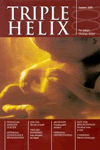It is shameful that about 45% of the people of sub-Saharan Africa live on less than one dollar a day, a proportion that has scarcely changed in the last eleven years, the very period when the structural adjustment programmes of the World Bank and the IMF should have been having some effect.
The loss of skilled people from Africa continues, whether in the overseas diaspora or into more lucrative private employment at home, so that training institutions find it hard to recruit staff and even harder to retain them. The difficulties seem insuperable and, even worse, they are now compounded by the HIV/AIDS epidemic.
Is this fair? Should it be allowed to pass unchallenged? Can not something be done? If the morale of countless health care workers in sub-Saharan Africa is to be strengthened, if their vision is to be enlarged, and if their hope is to be sustained, they must be given the opportunity to have continuing training and a chance to develop their skills. Then, they will be able to approach their work, not with despair and bewilderment, but with growing confidence, resourcefulness and effectiveness.
Eleven years ago a group of friends decided that we could indeed make a difference, however small: we therefore established the Tropical Health and Education Trust (THET); to relieve this disadvantage where we could, and to strengthen training for health care. Our policy is to work with those who are responsible for training health workers, for example the Dean or the Director of Nursing, and then to plan programmes, which are specifically designed to strengthen local training and meet local needs, over at least three and preferably five years.
We do not prescribe what should be done: rather, we respond to needs and requests. One of the best methods has been to link an overseas hospital or training school with a counterpart in the United Kingdom, and such links cover a wide range of subjects and staff. Other examples of our work include: continuing education for rural medical officers and support for psychiatric clinical officers in Uganda, students' field work and training of ophthalmic field workers in Ethiopia, training of medical officers for life saving surgery in Ghana, a students' prize for the best project report in seven countries, and support of a course for orthopaedic clinical officers in Malawi.
Many of these activities depend on the time and skills of short term visitors from the United Kingdom, who are often prepared to use their leave or give up holiday to share their skills and do something practical for those whose responsibilities are so great and yet whose opportunities are so slender. We have seen morale raised, skills strengthened and hope kindled. We're working to see more.
































